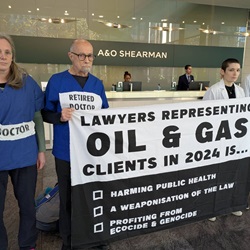
A climate protest at A&O Shearman last year organised by Lawyers Are Responsible
UK law firms facilitated a “staggering” $60bn in fossil fuel transactions in the last five years and many do not live up to the eco-credentials they claim, new research has argued.
City giants A&O Shearman, Clifford Chance, Freshfields, Hogan Lovells, Norton Rose Fulbright and Linklaters also scored the lowest mark, F, in the annual scorecard produced by Law Students for Climate Accountability (LSCA).
A&O Shearman was the ‘worst’ firm of all in terms of the value of fossil fuel transactions it had acted on, with Linklaters fifth.
The students marked the firms in the Vault 100, a US list of the firms assessed by associates as the most prestigious, according to how much fossil fuels work they have engaged in over a five-year period in three categories: litigation, lobbying and transactions.
While ‘mitigating’ work, such as renewable energy work, boosts firms’ grade, they do not simply offset fossil fuel work – this reflects LSCA’s belief that “the only way to halt climate change is to phase fossil fuels out entirely”.
Greenhouse gas emissions were “not netted out of the atmosphere simply because of the addition of more renewable energy”.
Firms that conduct no work for renewables companies cannot earn higher than a B.
A record high of 14 firms received an A, including Anglo-US firm Bryan Cave Leighton Paisner, “meaning that students and attorneys have a growing number of options for major firms that are not significantly engaging in fossil fuels work and are beginning to take on renewables work”, the report said.
Dentons and DLA Piper each scored Ds, which is considered a ‘fail’ by LSCA. In all, 38 firms received Fs (there is no E).
This “illustrates the theme of the legal industry’s contribution to the climate crisis: they exacerbate it. Adding in the ‘D’ firms, 71% of the Vault 100 receives a failing grade regarding its participation in the climate crisis”.
The research recorded that, although the Covid-19 pandemic caused a massive dip in fossil fuels work, “that work has rebounded in a huge way in 2024. Renewables work continues to increase, but the pace must be drastically sped up in order to meet the world’s energy needs…
“As the climate crisis escalates, the role of lawyers and the law in shaping climate action has never been more critical.”
The data showed that, from 2020 to 2024, the 100 firms acted in 623 “climate-exacerbating representations” in litigation, earned $36m for lobbying on behalf of fossil fuel interests, and facilitated over $2tn in transactions supporting fossil fuel work.
Lobbying and litigation saw an increase in both fossil fuel work and mitigating activities, but “the total renewables work done by Vault 100 firms pales in comparison to exacerbating work done”. For example, 82 of the litigation mandates were mitigating.
The report noted how law firms frequently advertise their work in renewable energy alongside their commitments to reducing emissions “while obscuring the amount of work they are doing on behalf of the fossil fuel industry”, highlighting this in its section on the UK.
“As the second largest legal market globally after the United States, the United Kingdom has a significant role to play in dealing with the climate crisis,” it said, but instead firms here facilitated “a staggering” $60bn in fossil fuel transactions in 2024 alone.
It profiled several firms from outside the Vault 100 that have made commitments to reduce emissions and done other positive work but whose fossil fuel work outweighed this, including CMS, Herbert Smith Freehills, Pinsent Masons, Slaughter and May, and Watson Farley Williams.
LSCA concluded: “In this climate crisis, we call on law firms to phase out their fossil fuels work and add more renewables to their practice.
“The ongoing global energy transition is an opportunity for firms to get ahead, and to shepherd the profession into the future.”
UK climate lobbying group Lawyers Are Responsible said the research revealed that the legal sector’s “current approach to sustainability is to have their cake and eat it too. This duality may be a winning strategy for their profit margins, but ultimately is a losing strategy for people and planet”.
Last year, the group published a counsel’s opinion that said it was “unlikely” the Solicitors Regulation Authority would take regulatory action against a solicitor who refused to work on fossil fuel matters for reasons of conscience.














Leave a Comment